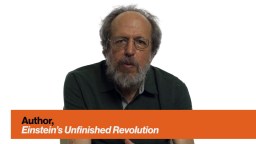Lee Smolin
Lee attended Harvard University for graduate school receiving a Ph.D. in theoretical physics in 1979. He held postdoctoral positions at the Institute for Advanced Study in Princeton, The Institute for Theoretical Physics (now KITP) in Santa Barbara and the Enrico Fermi Institute at the University of Chicago. This was followed by faculty positions at Yale, Syracuse and Penn State Universities, where he helped to found the Center for Gravitational Physics and Geometry. In September of 2001 he moved to Canada to be a founding member of the Perimeter Institute for Theoretical Physics, where he has been ever since.
Lee's main contributions to research are so far to the field of quantum gravity. He was, with Abhay Ashtekar and Carlo Rovelli, a founder of the approach known as loop quantum gravity, but he has contributed to other approaches including string theory and causal dynamical triangulations. He is also known for proposing the notion of the landscape of theories, based on his application of Darwinian methods to Cosmology. He has contributed also to the foundations of quantum mechanics, elementary particle physics and theoretical biology. He also has a strong interest in philosophy and his three books, Life of the Cosmos, Three Roads to Quantum Gravity and The Trouble with Physics are in part philosophical explorations of issues raised by contemporary physics.












